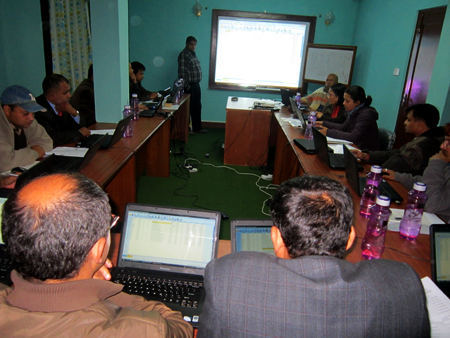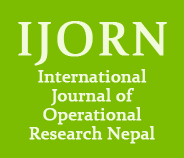Upcoming Events
Training on SPSS
APPLICATIONS OF COMPUTER TECHNOLOGY IN STATISTICS
(SPSS)
Needs for Training: Statistical methods have become very powerful tools in the area of scientific research. In practice, these methods are difficult or even impossible to implement - without the aid of appropriate software - due to their technical problems. However, the availability of microcomputer and appropriate software has tremendously reduced all the technical problems that arise in data related activities. Nowadays, statistical methods and computer technology play dominant role in applied research. Because of the interaction, a rapid shift in research paradigm has experienced in the past four decades. In this respect, our concerns must be directed towards effective and efficient way of handling raw data, its connectivity on deducting right conclusions for decision and learning support system, and eventually widening our knowledge in the changing context.

Objective: This training program attempts to address and resolve major practical problems arise in handling raw data and interpreting the results. The entire training program has been created with the following objectives.
• to enhance skill in data management, processing, application and interpretation through computer-based applications
• keeping balance between theory (lectures) & exercise (computer-based)
• adopting - 'learning by doing' - approach in a very conducive environment
Duration & Mode of Training: This is a 50-hours training program spread over 25 working days; two hours training class each day from 4.00 to 6.00 PM. (Sunday to Friday), including tea break. Lecture notes will be distributed to trainees. Every exercise will be carried out by trainees in the class under the guidance or assistance of resource persons. Exercises will be based on large data files related to socio-economic, demographic and management problems.
Participants: The participants must have at least bachelor degree in any discipline and should be computer literate. There will be 20 to 25 participants in one group.
Target Group: Working in GO/NGO/INGO office, doing Ph. D. and serious research scholars
Resource Persons: The resource persons of this training program are
• Prof. Devendra Chhetry [Ph D] Contact No. 9841437165
• Assistant Prof. Shital Bhandary [M Phil] Contact No. 9841328949
• Assistant Prof. Pravat Upreti [M Sc] Contact No. 9851073059
• Assistant Prof. Raju Manandhar, [M Sc], Training Coordinator (ORSN) Contact No. 9851070203
CONTENT OF TRAINING PROGRAM
The coverage of this training program is divided into seven modules, M1 through M7, as described below. Each module has definite objective.
|
M1 |
Lecture and discussion on Review of Applied Research & SPSS Lecture and discussion on Basic Rules for Data & Variable Management Questionnaire administration on participant and collection Exercises for teaching data editing, coding, creating file structure and data entry in SPSS, data cleaning using SPSS facilities, generating new variables using SPSS facilities & preliminary data analysis using SPSS facilities. |
|
M2 |
Lecture and discussion on Descriptive Statistics Exercises for generating univariate and bivariate tables from data files and interpreting them. Also learn to plot the table values in charts and diagrams Exercises for generating and interpreting summary measures – mean, mode, median, standard deviation etc. |
|
M3 |
Lecture and discussion on Inferential Statistics with Focus on Hypothesis Testing Exercises for enhancing skill in testing hypotheses and interpreting the results (learn to use tests for group mean comparisons (two independent sample t-test, and analysis of variance test) Exercises for enhancing skill in testing hypothesis of association and interpreting results (learn to use chi-square test) |
|
M4 |
Lecture and discussion on Correlation and Simple Regression Analysis Exercise for preparing scatter diagram and enhancing skill in estimating correlation matrix and simple linear regression model, testing significance of parameters and interpreting the results. Residual analysis will also be taught. |
|
M5 |
Lecture and discussion on Likert & other Scaling Techniques and Analyses of Likert Scale Exercise for developing skill in constructing reliable Likert scale as well as in doing both descriptive and inferential analyses. Non-parametric tests – Mann Whitney and Kruskal Wallis – will also be taught. |
|
M6 |
Lecture and discussion on Multiple Regression Analysis Exercise for estimating multiple linear regression model, testing overall significance of the model and regression coefficients, and interpreting the estimated model. Checking for the problems of estimated model will also be taught. |
|
M7 |
Lecture and discussion on indicators or indices of development and deprivation with discussion on Simpson’s paradox Lecture and discussion on Measurement & Analysis Practices of Development and Deprivation Exercises for measuring and analyzing development and deprivation |
Expected outcomes: Upon completion of the training program, participants are expected to develop skills on
1. management of variables and raw data in computer, including checking and correcting errors in the data file
2. generating one-way and two-way frequency tables and interpret them
3. generating summary measures – mean, mode, median, standard deviation – and interpret them
4. drawing charts and diagrams
5. estimating correlation matrix, simple and multiple regression model, and interpret the results
6. constructing and analyzing reliable Likert scale
7. testing association between two attributes (Chi-square test)
8. testing hypotheses of difference between two groups (independent two sample t-test and Mann Whitney test)
9. testing hypotheses of difference between more than two groups (ANOVA test and Kruskal-Wallis test)
10. testing hypothesis of normality (Kolmogorov-Smirnov test)
11. testing significance of correlations and regression coefficients
12. preparing profiles of development and deprivation
Venue: The training will be conducted at the building of Institute for Organizations & Career Developments (IOCD) at Jwagal, Kopundole - 10, Lalitpur [Infront of UN Park]
Date: The training will be conducted from November 28th to December 28th, 2011
Registration Fee: The registration fee for the whole training package is NRs. 20,000 per participant. The fee also includes training materials, tea-snacks and certificate.
Contact: Institute for Organizations & Career Developments (IOCD) Jwagal, Kopundole - 10, Lalitpur [In front of UN Park] Tel. 5260289
Contact Persons:
• Mr. Basanta Dhakal (9841284729),
• Mr. Govinda Tamang (9841284716),
• Mr. Raju Manandhar (9851070203)
